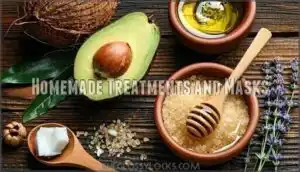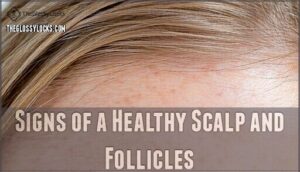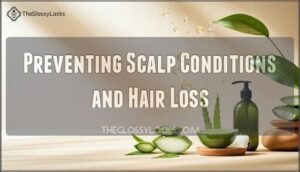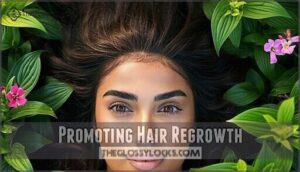This site is supported by our readers. We may earn a commission, at no cost to you, if you purchase through links.
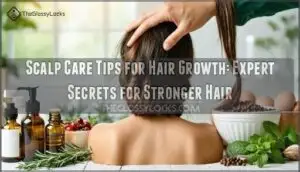 Transform your hair’s potential with these scalp care tips for hair growth. Start with gentle shampooing 2-3 times weekly using sulfate-free products, then massage your scalp for 5 minutes daily to boost circulation.
Transform your hair’s potential with these scalp care tips for hair growth. Start with gentle shampooing 2-3 times weekly using sulfate-free products, then massage your scalp for 5 minutes daily to boost circulation.
Apply nourishing oils like rosemary or peppermint twice weekly, leaving them on for 30 minutes before washing. Keep your scalp clean but not over-washed, and protect it from harsh styling tools and tight hairstyles that cause tension.
Stay hydrated and eat protein-rich foods to support follicle health from within. The foundation you build today determines tomorrow’s hair transformation possibilities, which can lead to a significant improvement in your overall scalp health and follicle health.
Table Of Contents
- Key Takeaways
- Scalp Care Basics
- Natural Scalp Treatments
- Stimulating Scalp Growth
- Maintaining Scalp Health
- Promoting Hair Regrowth
- Frequently Asked Questions (FAQs)
- How to care for scalp for hair growth?
- What is the best thing to put on your scalp for hair growth?
- What is a good scalp routine?
- What helps scalp hair growth?
- How do you stimulate the scalp for hair growth?
- What not to put on the scalp?
- What is the best scalp care routine?
- What causes hair loss?
- What stimulates natural hair growth?
- Can I use natural hair regrowth methods with other treatments?
- Conclusion
Key Takeaways
- Massage your scalp daily – Spend 5-10 minutes using circular fingertip motions to boost blood circulation and deliver nutrients to your follicles for stronger hair growth.
- Use rosemary oil treatments – Apply diluted rosemary oil twice weekly and leave it for 30 minutes before washing, as it’s proven to match prescription minoxidil’s effectiveness.
- Wash gently with sulfate-free shampoo – Cleanse 2-3 times weekly, focusing on your scalp rather than hair lengths, to maintain natural oil balance without stripping.
- Fuel growth from within – Eat protein-rich foods, stay hydrated, and consider biotin or vitamin D supplements to support follicle health and address nutritional deficiencies.
Scalp Care Basics
Your scalp acts like soil in a garden—without proper care, even the best hair growth efforts won’t reach their full potential.
Healthy scalp equals thriving hair—neglect your roots and even perfect products fail.
Understanding basic scalp maintenance creates the foundation for stronger, healthier hair by addressing the root environment where growth begins.
Gentle Hair Care Practices
Your scalp thrives with sulfate-free shampoos that preserve natural oil balance during gentle shampooing.
Focus washing techniques on your scalp using fingertips, not nails, with circular motions. Choose gentle hair care products containing nourishing product ingredients like hyaluronic acid.
Limit heat styling to prevent follicle damage. Apply gentle techniques by concentrating on scalp massage rather than hair lengths.
Proper washing frequency depends on your hair type—this foundation creates ideal conditions for stronger hair growth through consistent, mindful care practices.
Protective Hair Habits
Your daily habits dramatically impact follicle health and hair growth success.
Start with these protective strategies:
- Silk Scarves and pillowcases minimize friction during sleep
- Loose Styles prevent tension-related follicle damage
- Gentle combing techniques reduce breakage prevention needs
- Night Protection through proper hair wrapping methods
- Breakage Prevention via strategic styling choices
These foundational hair care routine adjustments create ideal conditions for scalp health and sustained hair growth.
Remember to use sunscreen to protect against harmful UVA radiation.
Wash Routine and Frequency
Your washing frequency matters more than you think.
Oily scalps need daily cleansing with sulfate-free shampoo, while dry or curly hair thrives with 2-3 weekly washes.
Use lukewarm water temperature to avoid irritation and focus shampoo techniques on roots where product buildup accumulates.
The double wash method removes stubborn residue—first wash lifts dirt, second delivers nutrients.
Adjust your routine with seasonal adjustments as humidity and temperature affect oil production, making personalized scalp care your foundation for healthy growth.
Natural Scalp Treatments
You don’t need expensive treatments to transform your scalp health and boost hair growth.
Natural remedies using essential oils, homemade masks, and plant-based extracts can deliver powerful results that rival commercial products, providing a natural alternative.
Essential Oils for Hair Growth
Essential oils pack serious punch for your scalp care routine.
Rosemary oil delivers results matching prescription minoxidil, while peppermint oil accelerates growth 92% faster than standard treatments.
Natural oils deliver clinical-grade hair growth results that rival expensive treatments.
Lavender oil boosts follicle activity and soothes inflammation.
Essential oils can also positively influence the hair growth phases.
Mix specific oils with carrier oils like jojoba or coconut—never apply undiluted.
Create powerful oil blends combining rosemary, peppermint, and lavender for synergistic effects.
Safe application methods involve massaging diluted oils into your scalp for 5-10 minutes.
Watch for oil safety concerns like skin irritation.
These natural powerhouses transform ordinary hair growth routines into clinical-grade treatments.
Homemade Treatments and Masks
Several DIY ingredients from your pantry become powerful scalp treatments when combined strategically.
These homemade masks deliver professional results while controlling costs and avoiding harsh chemicals.
Create targeted solutions using natural components:
- Avocado and coconut oil mask – Rich fatty acids penetrate deeply, transforming dry, flaky scalp into smooth terrain
- Brown sugar and honey scrub – Gentle crystals lift away buildup while honey’s antimicrobial properties soothe irritation
- Egg yolk and olive oil treatment – Protein strengthens follicles as essential oils nourish from root to tip
- Oatmeal and yogurt blend – Calming oats reduce inflammation while probiotics balance scalp microbiome naturally
Apply these oil infusions twice weekly for ideal mask frequency.
Many find that natural oils moisturize effectively.
Store treatments in refrigerated containers for up to one week, ensuring fresh scalp exfoliation benefits with each application.
Natural Oils and Extracts for Scalp Health
Natural oils pack serious punch for your scalp care routine. Rosemary oil delivers hair growth results that rival prescription treatments, while coconut oil penetrates deep for moisture. Jojoba oil mimics your scalp’s natural sebum, creating perfect balance.
Carrier oils like sweet almond enhance extract efficacy when you create DIY blends. Warm oils boost scalp absorption – think of it as opening your follicles’ front door.
Mix rosemary with jojoba for a powerhouse combo that transforms your healthy scalp from the ground up. Understanding the benefits of rosemary oil products can help you make informed decisions about your scalp care routine.
Stimulating Scalp Growth
Stimulating blood flow to your scalp acts like turning on a sprinkler system for your hair follicles.
Through targeted massage techniques and specialized tools, you can boost circulation to deliver the nutrients your hair needs to grow stronger and thicker, which is crucial for achieving thicker hair.
Scalp Massage Techniques and Benefits
Scalp massage acts like a personal trainer for your hair follicles. Scalp stimulation through targeted techniques delivers impressive massage benefits by boosting scalp blood flow and promoting hair regrowth.
Your follicle health improves when you create this circulation boost consistently. Regular use of a scalp massager tool can enhance these techniques.
Master these proven scalp massage techniques:
- Use fingertips in circular motions for 5-10 minutes daily across your entire scalp stimulation zone
- Apply gentle pressure while moving skin against skull to activate dormant follicles
- Focus on thinning areas with extra attention for maximum hair growth potential
Tools for Scalp Stimulation and Massage
Beyond using your hands, the right tools can supercharge your scalp massage routine and boost hair growth results.
Manual scalp massagers with silicone bristles offer gentle exfoliation while increasing blood circulation. These waterproof tools work perfectly in the shower, helping remove product buildup without causing breakage. Massage brushes with rubber or wooden bristles provide deeper stimulation than fingertips alone.
Electric scalp massagers deliver consistent vibration and rotation, making them ideal for stress-related hair loss. Some models include red light therapy to activate dormant follicles and promote cellular turnover.
Scalp rollers and micro needling tools create tiny channels that enhance serum absorption while triggering healing responses. These budget-friendly options pair well with growth treatments like minoxidil.
Using the right technique with a scalp massager tool can greatly enhance the effectiveness of your hair care routine.
| Tool Type | Material | Best For |
|---|---|---|
| Manual Massagers | Silicone bristles | Daily gentle care |
| Electric Devices | Medical-grade plastic | Deep stimulation |
| Derma Rollers | Titanium needles | Treatment absorption |
| Massage Brushes | Natural wood | Product removal |
Clean tools weekly to prevent bacteria buildup.
Importance of Blood Flow for Hair Growth
Proper blood circulation transforms your scalp into a thriving environment for hair growth.
When blood flow increases, your hair follicles receive a steady stream of oxygen and nutrients while toxins get swept away efficiently.
Scalp massage boosts circulation by up to 69%, creating ideal conditions for stronger strands.
This enhanced blood flow awakens dormant follicles and supports cellular regeneration at the root level.
- Nutrient uptake improves when circulation delivers vitamins directly to follicles
- Oxygen delivery energizes hair cells for robust growth cycles
- Waste elimination removes metabolic byproducts that block healthy development
- Follicle activation stimulates previously inactive hair roots
- Scalp stimulation maintains consistent blood circulation for sustained results
Understanding the importance of scalp blood flow is vital for promoting healthy hair growth and addressing related issues.
Maintaining Scalp Health
Knowing what a healthy scalp looks like helps you catch problems early and maintain ideal growing conditions for your hair.
Your scalp’s health depends on several key factors, from genetics to daily habits, and preventing common conditions protects your follicles from damage that could slow or stop hair growth.
Signs of a Healthy Scalp and Follicles
Visual assessment reveals ideal scalp health through distinct characteristics.
Your healthy scalp displays subtle pink scalp tones without inflammation, maintains smooth texture, and achieves proper scalp balance.
Sebum production appears neither excessive nor deficient, creating ideal conditions for follicle health.
| Visual Signs | Tactile Feel | Hair Indicators |
|---|---|---|
| Pink undertones | Supple texture | Strong attachment |
| Smooth surface | No tenderness | Even hair density |
| No flaking | Comfortable brushing | Minimal shedding |
| Clear follicles | Balanced moisture | Healthy shine |
Using the right scalp massage oil products can enhance your scalp care routine.
These indicators confirm your scalp massage and care routine effectively supports hair follicle stimulation and sustained hair growth.
Factors Affecting Scalp Health and Hair Growth
Understanding what affects your scalp health helps you make smarter hair care choices.
Multiple factors work together to influence your follicles’ performance and overall scalp condition.
- Genetics Impact – Your DNA determines follicle sensitivity and natural growth patterns you can’t change but can work with.
- Hormonal Balance – Fluctuating hormones trigger inflammation and disrupt healthy scalp environments during stress or life changes.
- Stress Effects – Chronic tension throws off natural growth cycles and weakens follicle function substantially.
- Nutrient Deficiency – Poor diet limits essential nutrient delivery to your scalp and hair follicles.
- Environmental Factors – Pollution, sun damage, and harsh weather conditions compromise your scalp’s protective barrier daily.
Preventing Scalp Conditions and Hair Loss
Prevention beats treatment every time in the context of scalp health. Watch for early warning signs like persistent scalp irritation, unusual hair thinning, or changes in your scalp’s texture.
Keep your follicle care routine consistent—gentle cleansing removes buildup without stripping natural oils. For itch prevention, avoid scratching and address triggers quickly.
Dandruff control starts with proper hygiene and stress management. Regular scalp care creates an environment where hair growth thrives.
Address scalp conditions immediately to prevent permanent hair loss. Your scalp’s health today determines tomorrow’s hair strength.
Understanding scalp health basics is essential for maintaining a healthy scalp and promoting hair growth.
Promoting Hair Regrowth
When your hair growth stalls, the right combination of nutrition, supplements, and targeted treatments can restart your follicles’ growth cycle.
Strategic pairing of natural methods with clinical approaches creates the ideal environment for regrowth while addressing underlying deficiencies that may be limiting your hair’s potential.
Diet and Nutrition for Hair Growth and Scalp Health
Building ideal scalp nutrition requires strategic food choices that fuel follicle health from within.
Your hair’s foundation depends on consistent nutrient balance through targeted food therapy.
Essential components for scalp nutrition include:
- Protein powerhouses – Eggs, lean meats, and fish provide building blocks for strong hair structure
- Omega rich foods – Salmon, walnuts, and flaxseeds reduce scalp inflammation while nourishing follicles
- Vitamin boost sources – Leafy greens, berries, and citrus fruits deliver antioxidants that protect against hair damage
- Iron-rich options – Spinach, lentils, and lean beef prevent deficiency-related hair loss
Supplements and Vitamins for Hair Regrowth and Strength
Biotin benefits include strengthening keratin production, though supplementation helps mainly if you’re deficient.
Vitamin D creates new follicles—deficiency strongly correlates with hair loss.
Omega supplements reduce scalp inflammation while delivering essential fatty acids.
Key hair minerals like zinc and iron prevent shedding when levels drop.
Protein powder supports hair structure since strands are mostly protein.
Choose quality hair growth supplements and consult your doctor first.
Combining Natural Methods With Medical Treatments for Optimal Results
Combining natural treatments with medical therapies delivers superior results.
This holistic approach leverages synergistic therapy principles for ideal hair regrowth:
- Integrative care pairs rosemary oil with minoxidil for enhanced follicle stimulation
- Scalp massage amplifies PRP therapy effectiveness during treatment sessions
- Medical supplements combined with scalp exfoliation create thorough personalized treatment
This natural hair growth strategy maximizes your scalp treatment outcomes.
Frequently Asked Questions (FAQs)
How to care for scalp for hair growth?
Think of your scalp as fertile soil—it needs gentle care to grow strong hair.
Massage regularly with rosemary oil, wash 2-3 times weekly with sulfate-free shampoo, and nourish with protein-rich foods for maximum growth.
What is the best thing to put on your scalp for hair growth?
Rosemary oil stands out as your best scalp treatment, matching prescription minoxidil’s effectiveness in studies.
You’ll boost circulation and stimulate follicles when you massage it in daily for ideal hair growth results.
What is a good scalp routine?
Nurturing your scalp is like tending a garden — it needs consistent care to flourish.
Start with gentle shampooing 2-3 times weekly using sulfate-free products, followed by scalp massage with rosemary oil to boost circulation and stimulate growth effectively.
This approach will help to stimulate growth and keep your scalp healthy.
What helps scalp hair growth?
Scalp massage increases blood flow to follicles, delivering nutrients that fuel growth. Essential oils like rosemary stimulate circulation as effectively as prescription treatments, while gentle cleansing preserves natural oils.
How do you stimulate the scalp for hair growth?
Massage your scalp with fingertips using circular motions for 5-10 minutes daily to boost blood circulation and deliver nutrients to follicles, promoting stronger hair growth naturally.
What not to put on the scalp?
Sure, slather petroleum jelly on your scalp daily—because nothing says "healthy hair growth" like clogged follicles.
Avoid heavy oils, sulfates, alcohols, fragrances, and harsh chemicals that strip natural oils, irritate skin, and disrupt your scalp’s delicate microbiome balance.
What is the best scalp care routine?
Create a gentle routine using sulfate-free shampoo 2-3 times weekly, followed by scalp massage with rosemary oil for circulation.
Double-cleanse to remove buildup, then nourish with natural oils like jojoba or coconut for ideal follicle health.
What causes hair loss?
Like dominoes falling in sequence, hair loss stems from disrupted follicles caused by genetics, hormones, stress, poor nutrition, scalp conditions, medications, and inadequate care practices that compromise your scalp’s health.
What stimulates natural hair growth?
Regular scalp massage boosts blood circulation, delivering nutrients to follicles.
Essential oils like rosemary stimulate growth effectively.
Proper nutrition with protein, biotin, and omega-3s nourishes from within for ideal results.
Can I use natural hair regrowth methods with other treatments?
Combining complementary care creates thorough results.
You can pair rosemary oil with minoxidil, add scalp massage to PRP therapy sessions, and integrate nutritional supplements with medical treatments for enhanced follicle stimulation and ideal regrowth outcomes, which leads to thorough results and enhanced follicle stimulation.
Conclusion
Successful scalp care strategies start simple but create significant transformations through consistent commitment.
You’ve learned proven scalp care tips for hair growth that work when applied regularly.
Daily massages boost blood circulation while weekly oil treatments nourish follicles deeply.
Clean, balanced washing routines prevent buildup without stripping natural oils.
Your nutrition choices directly impact follicle strength and growth potential.
Remember, healthy hair begins beneath the surface with proper scalp care fundamentals and patience-driven persistence.
- https://www.cdc.gov/hygiene/about/hair-and-scalp-hygiene.html
- https://www.carolsdaughter.com/blog/hair/hair-care-tips/scalp-care-routine.html
- https://www.livingproof.com/blogs/hair-101/healthy-scalp-tips
- https://www.100percentpure.com/blogs/feed/healthy-scalp-gorgeous-hair-nurturing-your-hair-from-the-roots
- https://www.health.harvard.edu/diseases-and-conditions/vitamins-minerals-and-hair-loss-is-there-a-connection


